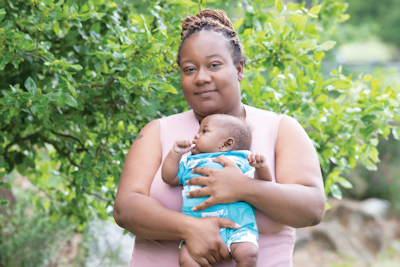After serious pregnancy-related complications landed Precious McCoy in the hospital in 2019 — two weeks after delivering her second child — she didn’t hesitate to head to Tanner Medical Center/Carrollton’s Emergency Department (ED) this February when she began experiencing alarming symptoms just one week after the birth of her third child.
The diagnosis both times was preeclampsia, a condition in pregnancy characterized by high blood pressure, sometimes with fluid retention and protein in the urine. Symptoms of McCoy’s first bout included a searing headache that “Tylenol didn’t even touch,” she said. She also noticed her eyesight was failing, including blurriness and black spots — all triggered by the fluid buildup in her body.
Prompt in-patient treatment for five days, including spinal and optic nerve surgeries to remove excess fluid, followed. McCoy recovered physically except for her permanently impaired eyesight; in 2019, she was diagnosed as partially blind with significantly reduced peripheral vision in her left eye.
Thankfully, the outcome was much better with her third pregnancy earlier this year. Due to McCoy’s quick action to seek immediate medical care, a full-blown case of the potentially life-threatening condition was averted.
Still, she was hospitalized for three days with spiking blood pressure and fluid buildup in her lungs, making it hard to breathe.
“McCoy is a success story”
 Today, McCoy is doing well and bonding with her newborn son Kyree, as well as enjoying firstborn son Praylen, 6, daughter, Skylar, 2 1/2, and husband, Deangelo. She continues to be monitored by her Tanner Women’s Care team as part of her postpartum care and consults regularly with a neurologist.
Today, McCoy is doing well and bonding with her newborn son Kyree, as well as enjoying firstborn son Praylen, 6, daughter, Skylar, 2 1/2, and husband, Deangelo. She continues to be monitored by her Tanner Women’s Care team as part of her postpartum care and consults regularly with a neurologist.
Despite her impaired vision, McCoy is a success story: she’s alive to enjoy her family and her life, and to share her story to help other women, said Megan Grilliot, MD, board-certified in obstetrics and gynecology and a member of McCoy’s care team at Tanner Healthcare for Women.
Dr. Grilliot serves as medical director of obstetrics and gynecology for Tanner Health System and medical operations leader of women’s and children’s services for Tanner.
“Pregnancy, childbirth and those first days with a new baby are so exciting — but can also be very scary. New moms are often so distracted by their newborn’s needs and getting into a new routine — in addition to possibly other children needing attention, too — that they may miss signals that they need care for themselves, too.
“Precious McCoy is doing well and in a good place because she immediately came to the hospital when she realized what she was experiencing was not normal. She sounded the alarm that she needed help,” said Dr. Grilliot.
What is maternal mortality?
Maternal mortality is defined as the death of a woman during or within 12 months of completing a pregnancy.
In 2019, the most recent year for which Centers for Disease Control and Prevention (CDC) statistics are available, 754 women were identified as having died of maternal causes in the United States, up from 658 in 2018. That’s a maternal mortality rate of 20.1 deaths per 100,000 live births for 2019, up from 17.4 for 2018.
And for Black women, the risk is more than double that, likely related to issues including access to care, quality of care, and the prevalence of chronic diseases including heart disease and diabetes, among other factors.
Prenatal and postpartum care is important for healthy moms and babies, but complications can arise for any woman regardless of her care.
“The leading cause of maternal mortality is cardiovascular conditions, and the majority of maternal deaths occur in the postpartum period,” said Dr. Grilliot.
The Tanner Women’s Care team works closely with Tanner Heart & Vascular Specialists on the specialized care for these patients.
Patients delivering by cesarean section (C-section), like McCoy, are also more likely to experience complications, according to Dr. Grilliot. “This is a surgical procedure, and moms need time to recover. They are at risk for other serious conditions, including blood clots and infection.”
Watch for red flags
Warning symptoms to watch out for during pregnancy and delivery, up until one year after delivery, include:
- A headache that won’t go away or gets worse over time
- Fever of 100.4 degrees Fahrenheit or higher
- Trouble breathing
- Chest pain or a rapid heart rate
- Severe swelling, redness or pain of the leg or arm
- Changes in vision
- Dizziness or fainting
Immediate medical attention should be sought at a hospital emergency department if any of these symptoms occur.
McCoy offers a strong voice of experience for other pregnant or new moms: “If you have any possible symptoms, you need to go to the hospital. It can turn into something pretty big, pretty fast. It is very important to me that you learn from my story.”
She also stresses the importance of open communication with physicians and other caregivers.
“I am so grateful for the team of Tanner doctors behind me through this experience. I have a very tight relationship with all of them, and we are on the same page when it comes to my care. After the complications with my second pregnancy, I knew I needed to be alert to any symptoms that meant I might be headed for trouble again when my son Kyree was born. My care team understood how concerned I was,” said McCoy.
She expresses her appreciation for Amy Goss, MD, the obstetrics and gynecology specialist with Tanner Healthcare for Women, who delivered her son in February by C-section and quickly re-admitted her a week later for monitoring and care for those early signs that she was developing preeclampsia —heading off more serious illness.
Encouraging Better Birth Days
 Dr. Grilliot and other members of Tanner Women’s Care have invested significant time and resources in educating all Tanner providers — regardless of their specialty — who may see a pregnant or recently-delivered mom in a care setting so they can quickly diagnose and refer them for treatment of pregnancy-related complications.
Dr. Grilliot and other members of Tanner Women’s Care have invested significant time and resources in educating all Tanner providers — regardless of their specialty — who may see a pregnant or recently-delivered mom in a care setting so they can quickly diagnose and refer them for treatment of pregnancy-related complications.
In addition, a multi-faceted public awareness campaign, “Better Birth Days,” was launched on Mother’s Day 2021 and continues across Tanner’s service area to ensure patients and their loved ones recognize and seek medical attention for these complications. Materials are available in both English and Spanish. Learn more at tanner.org/better-birth-days.
“Loved ones supporting a pregnant or new mom are in a good position to pick up on symptoms mom may be ignoring or postponing dealing with in hopes they’ll just go away. The reality is they often won’t, and delay can cost a woman her life. Prompt medical attention is imperative,” said Dr. Grilliot.
“Today, there is much more isolation during pregnancy and postpartum. The birth of a child used to be a more communal event, and women were surrounded by a very close support system. That has fallen away over time. This cultural shift has been decades in the making, but the COVID-19 pandemic has exacerbated it. This contributes to the physical and mental health conditions we are seeing now. Pregnant and new moms need this critical emotional and physical support for themselves and their babies, in addition to good prenatal and postpartum care,” said Dr. Grilliot.
McCoy says she’s been blessed with strong family support, which includes her husband, mom and sister, through all of her pregnancies. They came together to help care for the newborns and older siblings while she was hospitalized and when she returned home and needed support herself. This was especially helpful after her daughter was born since McCoy’s vision was still impaired from her preeclampsia.
Breastfeeding remained a priority for McCoy even with the complications and hospitalizations following her last two pregnancies. She was able to provide that important nourishment for her babies thanks to the support of her family and the clinical team at Tanner Medical Center/Carrollton. She continued to pump breast milk, which was then sent home to feed her babies until she was released from the hospital.
Growing mental health, addiction issues
Nationwide, providers like Dr. Grilliot also report increased concerns related to mental health — anxiety and depression, and addiction among pregnant and new moms — in line with trends in the general population.
“Postpartum depression is a very real and severe illness. When it’s not diagnosed and managed appropriately, it can result in self-harm and suicide. A mother taking her own life, and possibly that of her child, is an absolute tragedy,” said Dr. Grilliot.
“Women sometimes think they can ‘will’ themselves out of this if they are just strong enough. That’s not the case. We have services and expertise to help them, but they need to let someone know that they are struggling,” said Dr. Grilliot.
All women giving birth at the birthing centers at Tanner Medical Center/Carrollton and Tanner Medical Center/Villa Rica are screened for postpartum depression while in the hospital and again at four weeks to pick up on symptoms consistently and initiate appropriate care.
Financial barriers to care
The cost of prenatal and postpartum care can be a barrier for some moms, according to Dr. Grilliot, but she’s encouraged to see some improvements already underway and on the horizon.
“Most women do want to receive good care for themselves, but when you don’t have insurance coverage, that’s very difficult. Fortunately, coverage is getting better here in Georgia and across the country, although there’s still an opportunity for improvement. Almost half of the women who give birth in Georgia every year are on Medicaid” said Dr. Grilliot.
In 2020, the Centers for Medicare and Medicaid Services (CMS) expanded coverage to six months for all moms across the country — an increase from the prior 60-day limit. Now, a Georgia bill has been unanimously passed in the Senate and is on its way to the Georgia House of Representatives and Gov. Brian Kemp for approval to expand that coverage to 12 months after delivery.
“This has the potential to make a significant difference in our ability to continue to care for women during this critical postpartum period,” said Dr. Grilliot.
For more information on how Tanner helps deliver healthy moms and babies, visit tanner.org/better-birth-days.
Learn more about Tanner Women’s Care at tanner.org/womens-care.